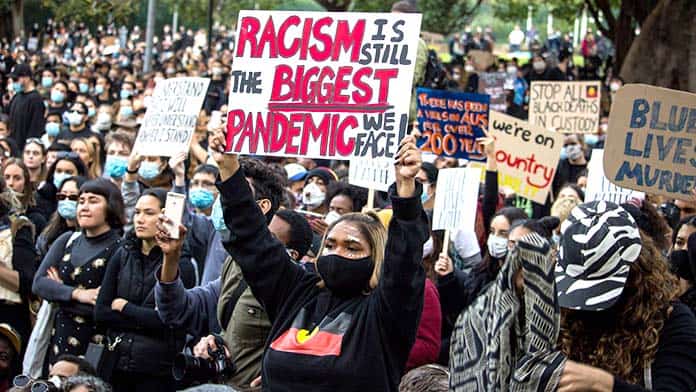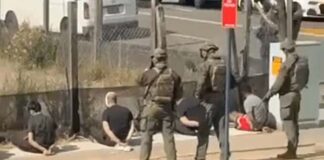The rebellion against racism and police brutality in the US has found echoes all around the world.
The treatment of Indigenous people by cops and the prison system here mirrors the racist targeting Black people face in the US. Africans, Asians and Muslims alike also face racism in Australia—including from the police.
Tens of thousands of people—Indigenous, white, Asian and Black—have flooded the streets nationwide to declare that Black Lives Matter (BLM). At least 50,000 marched in Melbourne, 40,000 in Sydney and 20,000 in Brisbane, along with the largest rallies for some time in places like Darwin, Rockhampton, Newcastle and Wagga Wagga.
This was despite a government campaign against people protesting, claiming it risked spreading coronavirus. Two weeks on, there is no evidence of a single case resulting from the rallies.
But it also showed the official contempt for the right to protest. Thousands have been allowed to gather at schools, shopping centres and workplaces. The right to organise and protest is essential to being able to force change. We can’t let it be suspended for months into the future.
George Floyd was brutally murdered by a racist cop with a long history of abuse.
In Australia 438 Aboriginal people have been killed in custody since the Royal Commission into Black Deaths in Custody in 1991. Yet police and prison guards continue to kill with impunity. Not one has ever been convicted over a death in custody.
The killing of David Dungay Jnr is one of the most graphic recent cases. Despite his death at the hands of five prison guards, calling out 20 times “I can’t breathe”, the NSW Coroner refused to recommend charges against anyone.
But the uprising in the US has shown how it’s possible to win change. Derek Chauvin, the cop who killed George Floyd, has had his charge upgraded to second degree murder. The three other officers involved were also charged.
The Minneapolis City Council has voted to defund and dismantle the police department. New York’s Mayor has committed to redirecting some of the city’s $6 billion police budget to social services. Schools in Minneapolis, Denver and Portland have ended contracts with police to work there.
Economic crisis
The uprising in the US has been fuelled by the disproportionate deaths of African-Americans from the coronavirus, and the surge in unemployment through the economic shutdown.
In Australia, unemployment in May rose to 7.1 per cent, the highest for 20 years. It sits at 11.3 per cent, including those who have lost jobs but aren’t looking for work. And it will get worse in September with the end of JobKeeper.
Morrison may extend the scheme for some sectors like tourism, signalling an announcement on 23 July. But there will be deep anger if JobSeeker unemployment payments plummet back to pre-coronavirus levels of $40 a day, as the government has indicated—especially after the news it spent $60 billion less on JobKeeper than budgeted.
Bosses and the government are using the crisis to attack workers and force through their agenda. The Coalition have announced plans to double student fees for humanities courses, to force students into the areas business wants. Some students will see lower fees, but overall the changes will force more of the cost of education onto students.
Morrison is also preparing attacks on workers’ rights following his so-called “Accord” talks with the unions, hoping unions will accept pay cuts and other concessions to benefit business.
These attacks can be stopped. We need a fight to demand Morrison fund a massive program of spending on jobs to tackle unemployment. This could fund proper services to improve the lives of Indigenous people, as well as expand renewable energy.
The CFMEU construction union in Sydney is planning a stopwork rally in October. The same kind of action is needed from other workers, including NTEU members at universities.
The militant spirit of the Black Lives Matter rally in Sydney, where tens of thousands took the streets in defiance of a court order, is needed in our unions, facing draconian anti-strike laws.
And the fight against racism has to be connected to a fight against the economic inequality and unemployment that destroys the lives of Indigenous people, migrants and white workers alike.
In a brilliant display of solidarity, on 19 June strikes and mass rallies led by the ILWU shut down all ports on the US West Coast in solidarity with Black Lives Matter. Unions in Australia need to back the upcoming protests for BLM and for justice for David Dungay and others killed in custody.
The racist police and prisons are a product of a system that sets out to oppress and divide workers in order to protect the profits of the rich.
We need a united working class fightback for jobs, services and living standards—and against the capitalist system that is plunging us into economic crisis and Depression-level unemployment.






